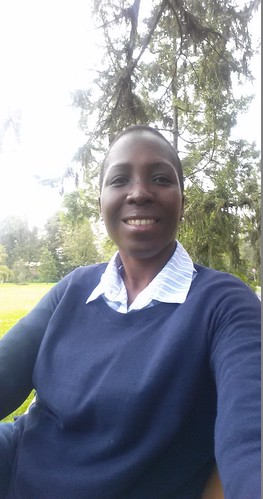RISING voices: Mariama Fofanah, nutrition specialist at the International Potato Center (CIP)
Mariama Fofanah, nutrition specialist at the International Potato Center (CIP), introduces herself and her work with the program. It is one of a series of portraits of key people in Africa RISING.

Tell us about your background
I am from Sierra Leone. I obtained my Bachelors (BSc) degree and a Master’s of Public Health degree (MPH) in Global Health Nutrition from Johns Hopkins University and George Mason University United States, respectively. My research interests include nutrition, agriculture and health linkages, policy advocacy, social and behaviour change communication. I joined the International Potato Center as a nutrition consultant in 2011 working mostly on nutrition sensitive agriculture program design, implementation and capacity building in particular, promoting food-based approaches to improve nutrition and food security in Ethiopia. Prior to CIP, I worked with health care agencies and NGOs primarily in designing and implementing social behaviour change, advocacy and nutrition promotion programs targeting disadvantaged populations.
What do you do in your current position?
Currently, I coordinate nutrition related research activities within the Africa RISING project in the Ethiopian Highlands. My main role is to mainstream nutrition in the design, planning and implementation of research protocols. In particular, I work closely with the Africa RISING nutrition research team as the principal investigator for the protocol “Integrating nutrition in to the crop/livestock farming systems of the Ethiopian highlands for improved nutrition outcomes”. Our research examines community dietary practices and behaviours, farming practices, as well as nutrition-related policy and institutional issues. In addition to this, I provide relevant technical advice to implementing partners; help design nutrition education and behaviour change resources and support nutrition training and capacity building. The goal is to gain a thorough understanding of agriculture pathways to nutrition particularly for women and children and to ensure that farmers across all sites are diversifying production systems and diets for better nutrition.
What are your next plans for Africa RISING?
“Developing a proof of concept” related to effective agriculture pathways to improved nutrition. Formative research studies and needs analysis are now complete and some of the data has already been analysed and initial results documented in briefs. Our next steps are to share findings, design nutrition education/behaviour change materials, and conduct nutrition training of trainers targeting relevant stakeholders including the bureaus of agriculture, health, innovation platform members and farmer groups. Key outcomes would be empowering communities and strengthening the collaboration between agriculture and health sector to tackle food and nutrition issues. Further work will entail collaborating with other CGIAR partners, government, NGOs and the private sector to look at bio-fortification of staples using zinc fertilizers, irrigated vegetable production, complementary food processing and nutrition sensitive value chains (milk, butter processing).
What are the biggest Africa RISING challenges and how do we deal with them?
Africa RISING project involves complex collaborations among different CGIAR partners, government agencies at local and regional levels and farmers held together by a shared vision. These partnerships are valuable but the challenge is managing and harmonizing wide ranging priorities and perspectives, as well as tracking different outputs, deliverables and finances. Dealing with these issues is a learning process, we focus on achieving the common agenda through effective communication; understanding and valuing what each sector or partner contributes to achieving the common vision.
What are some of the main achievements of this program?
In the Africa RISING project sites, farmers face multiple problems of food insecurity, under nutrition, land degradation, lack of alternative income, feed, low crop yields, among others. The project has so far, managed to empower decision makers and farmers to tackle these problems holistically using a systems approach. It has also done well in strengthening local capacities, and ensuring cross-cutting themes of gender, nutrition and climate change are embedded in program planning and implementation.
What gives you hope looking at a possible second phase, based on the first phase?
I see the first phase of the project as laying the foundation – finding out what works and learning useful lessons. We now have a strong foundation to build on successes. Based on the first phase, Africa RISING would have a chance to fully leverage the many opportunities identified during the first phase and we should begin to see tangible results, the possibility of out scaling these technologies gives me hope.




